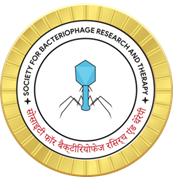About Us
Overview
The society for Bacteriophage research and therapy was created in the year 2017 and officially registered on 19 December 2018.
Our terrific society of professionals is a network on which I have become increasingly reliant when facing these new challenges and opportunities.
The bacteriophages are naturally present in the environment and are the most abundant organism on Earth.
The society for Bacteriophage research and therapy was created in the year 2017 and officially registered on 19 December 2018.
Our terrific society of professionals is a network on which I have become increasingly reliant when facing these new challenges and opportunities.
The bacteriophages are naturally present in the environment and are the most abundant organism on Earth.
About Us
SBRT
The society for Bacteriophage research and therapy was created in the year 2017 and officially registered on 19 December 2018. The society strives to work together to explore the applications of bacteriophages, especially in the context of antimicrobial resistance (AMR) and establish them as a viable option for treating drug-resistant infections. The society has created a platform where research can come together and share their knowledge and collaborate with phage scientist. The society offers annual and lifetime membership for the researchers. At present there are more than 85 members of which 70 are serving as a life member. By bringing together scientists, academicians, and clinicians conducting basic and translational research on bacteriophages, we aim to leverage the collective expertise and resources at the national and international level. Members of the society research on diverse aspects of bacteriophages such as prevalence of phages in rivers water and sewage treatment, clinical application of phages including their role as antibacterial agents, vaccines, in gene therapy, diagnostics, drug delivery, etc. Given the slow pace of drug discovery for infectious diseases and the widespread occurrence of AMR, it is about time that a concerted effort is made towards understanding the challenges of bacteriophages as therapeutics.
The society conduct technical conferences, seminars, and workshop at different parts of country to reduce the gap between curriculum and their practical implementation among students and research scholars. The society also acknowledges the contribution of the members by felicitating them with Young Scientist Awards, early career research awards and as Editorial team members for their noteworthy research in phage therapy. To enhance the scientific learning through research, society has established a scientific publishing journal. The journal strives to maintain a high standard and quality publications through peer review by experts in the field. International Journal of Bacteriophage Research publishes annually in the month of January. It publishes reviews, research papers on bacteriophage related topics, genetic engineering of phages, in-vitro and in-vivo experiments, molecular screening of phages.

President Overview
Dear Members, and Colleagues,
The changes around us whether social, political, technological, scientific, economic, or otherwise require that we help our research scholars, and scientists navigate through the new and increasingly complex aspect of bacteriophage research. In many instances, we are responsible to help shape translational research. Our terrific society of professionals is a network on which I have become increasingly reliant when facing these new challenges and opportunities.
I’m proud of our Society’s successes over the last three years, particularly in providing more opportunities for meaningful engagement of our members and students, introducing innovative programming formats and topics, and providing professional development and outreach opportunities. In the year ahead, we will continue these initiatives, as well as add programs designed for the different stages of your career, virtual programming, and events shall be held in collaboration with other societies on national and international platforms.
Thank you members for your continued participation and enthusiasm in our professional community, and your incredible support and advice. Finally, I’d like to give a special shout-out of appreciation to our former President Dr. Sanjay Chhibber, and former Secretary Dr. Gopal Nath, for their tireless work and for all the resources, guidance, and support they provide each and every day. Thank you all!
Dr. VinodKumar C.S
Professor, Department of Microbiology
S. S. Institute of Medical Sciences and Research Centre
Karnataka

Secretary Overview
Bacteriophages were discovered about a century ago by two independent scientists, Frederick Twort in 1915 and Felix d’Herelle in 1917. Later in 1919, d’Herelle started using phages to cure bacterial diseases, but the concept did not take off due to practical difficulties. Phages work as antimicrobial agents against pathogenic bacteria, which makes them unique. In the era of antibiotic resistance, it can make a revolution in medicine. The bacteriophages are naturally present in the environment and are the most abundant organism on Earth. The arousal of MDR, XDR and PDR bacteria created a panic situation globally that can be overcome by life-saving bacteriophage therapy. Recent clinical evidence proves that phages can effectively kill the superbugs that the last line antibiotics fail. It has many pros as it can be effective against both antibiotic-sensitive and -resistant pathogens, it can be used as monotherapy or along with antibiotics, easy to isolate phages from natural sources, and it can be used as a cocktail for multiple infections. Society for Bacteriophage Research and Therapy (SBRT) was established to promote the studies of bacteriophages in various fields. We aim to spread the goodness of phages in medicine, biotechnology, and environmental studies by holding hands with eminent scientists and researchers working in phages to create a healthy tomorrow. Our society works as a team with bacteriophage research experts from India. We effectively are working on the phages as they could be promising benefits shortly. Our society is conducting international conferences which aim to bring collaborative research networking across the globe. We also conduct webinars on phage research using eminent speakers to spread awareness about phage therapy and its application in the medical field. Our SBRT offers annual and lifetime memberships for the members. We encourage the willing people to join our hands to combat drug-resistant bacteria with the novel bacteriophages as therapeutic tools.
Dr. Ramesh N


